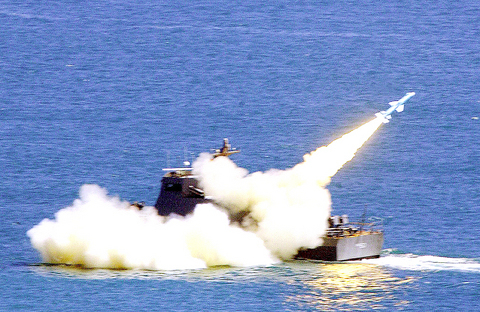China chastised President Chen Shui-bian (陳水扁) yesterday for his recent pro-independence comments, calling them a dangerous move that could cause further decay in ties between the two rivals.
Chen on Sunday told a pro-independence group that the nation should be independent and have a new constitution.
The comments were "a dangerous step forward," the Taiwan Affairs Office of the State Council said in its first official response.

PHOTO: SAM YEH, AFP
"It indicates that Chen wants to sacrifice the interests of the Taiwanese people," said the statement, which was read on state television's evening newscast.
"[Chen's] purpose cannot be achieved," it said. "China will continue to be committed to developing cross-straits relations but will never allow Taiwanese independence and secession and Taiwan's split from the motherland."
The statement came as China's top general said the nation's military would block any attempt by Taiwan to formalize its independence.
General Guo Boxiong (
It said Guo's comments were made at a discussion with military delegates to the national legislature on Monday.
Guo, a vice chairman of the government and Communist Party's Central Military Commission, ranks second only to Chairman Hu Jintao (胡錦濤), who is also China's president.
Guo also urged all PLA soldiers and officers to further "heighten [their] sense of responsibility and sense of urgency," and to make all-out efforts to "get well-prepared for military struggle," familiar exhortations that did not appear directed at recent events.
Just hours before Chen spoke on Sunday, China announced a 17.8 percent boost in its military spending, which is largely oriented toward Taiwan. The increase to 350 billion yuan (US$45 billion) was the biggest jump in more than a decade, although Washington believes the figure could be much higher.
The US, Taiwan's chief ally and military supplier, has said China faces no outside military threats. The US has questioned the reasons for the military buildup and called for greater transparency from the China's armed forces.
Chen's comments also drew a response from the US State Department, which reminded him of his pledges not to alter the status quo.
"Rhetoric that could raise doubts about these commitments is unhelpful," spokesman Sean McCormack said.
also see story:
Chen's weekend comments upset US

CHAOS: Iranians took to the streets playing celebratory music after reports of Khamenei’s death on Saturday, while mourners also gathered in Tehran yesterday Iranian Supreme Leader Ayatollah Ali Khamenei was killed in a major attack on Iran launched by Israel and the US, throwing the future of the Islamic republic into doubt and raising the risk of regional instability. Iranian state television and the state-run IRNA news agency announced the 86-year-old’s death early yesterday. US President Donald Trump said it gave Iranians their “greatest chance” to “take back” their country. The announcements came after a joint US and Israeli aerial bombardment that targeted Iranian military and governmental sites. Trump said the “heavy and pinpoint bombing” would continue through the week or as long

TRUST: The KMT said it respected the US’ timing and considerations, and hoped it would continue to honor its commitments to helping Taiwan bolster its defenses and deterrence US President Donald Trump is delaying a multibillion-dollar arms sale to Taiwan to ensure his visit to Beijing is successful, a New York Times report said. The weapons sales package has stalled in the US Department of State, the report said, citing US officials it did not identify. The White House has told agencies not to push forward ahead of Trump’s meeting with Chinese President Xi Jinping (習近平), it said. The two last month held a phone call to discuss trade and geopolitical flashpoints ahead of the summit. Xi raised the Taiwan issue and urged the US to handle arms sales to

State-run CPC Corp, Taiwan (CPC, 台灣中油) yesterday said that it had confirmed on Saturday night with its liquefied natural gas (LNG) and crude oil suppliers that shipments are proceeding as scheduled and that domestic supplies remain unaffected. The CPC yesterday announced the gasoline and diesel prices will rise by NT$0.2 and NT$0.4 per liter, respectively, starting Monday, citing Middle East tensions and blizzards in the eastern United States. CPC also iterated it has been reducing the proportion of crude oil imports from the Middle East and diversifying its supply sources in the past few years in response to geopolitical risks, expanding

Pro-democracy media tycoon Jimmy Lai’s (黎智英) fraud conviction and prison sentence were yesterday overturned by a Hong Kong court, in a surprise legal decision that comes soon after Lai was jailed for 20 years on a separate national security charge. Judges Jeremy Poon (潘兆初), Anthea Pang (彭寶琴) and Derek Pang (彭偉昌) said in the judgement that they allowed the appeal from Lai, and another defendant in the case, to proceed, as a lower court judge had “erred.” “The Court of Appeal gave them leave to appeal against their conviction, allowed their appeals, quashed the convictions and set aside the sentences,” the judges